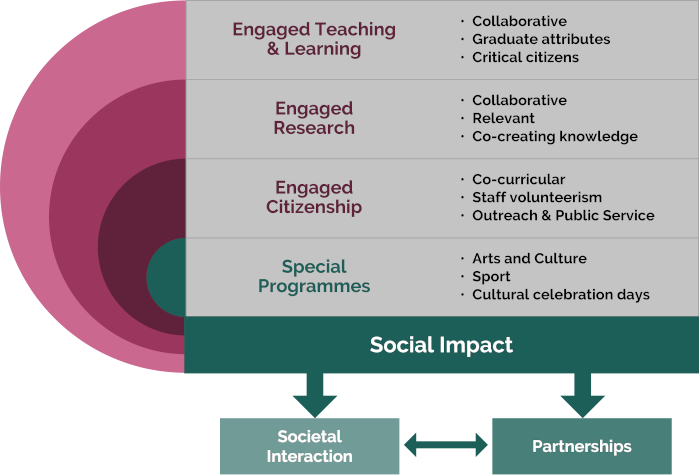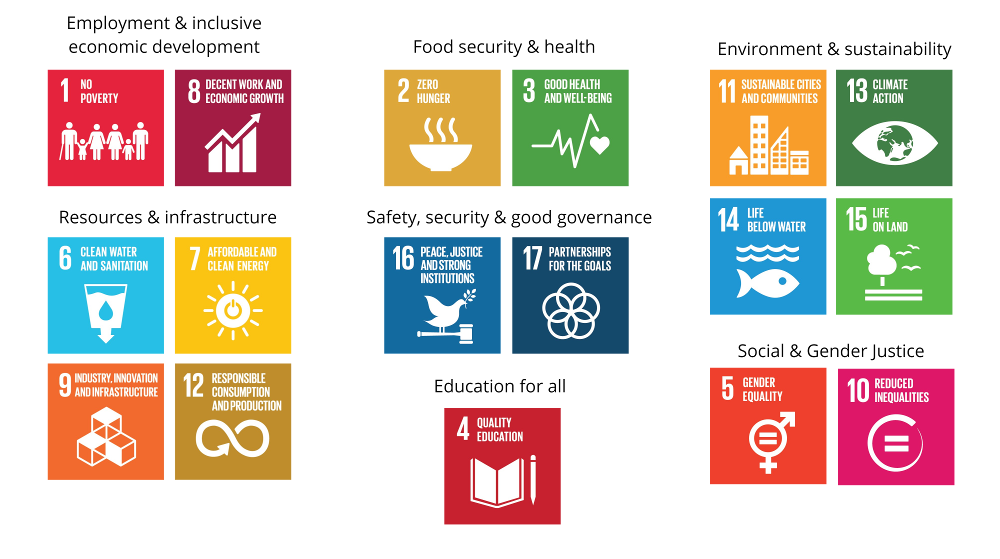SI STRATEGIC FRAMEWORK
The Social Impact Framework (SIF) of the Faculty of Medicine and Health Sciences (2019 – 2024) draws upon the vision of the
Social Impact Strategic Plan (SISP) of Stellenbosch University (SU).
The Social Impact Framework of the Faculty of Medicine and Health Sciences (2019-2024) acknowledges three levels at which sustained social change could be established namely community interaction, community engagement and social impact.
This framework incorporates the recently published SU Vision 2040 and the 2019-2024 strategic framework. The SISP (2017-2022) situates social impact as one of the three strategic priorities of the Stellenbosch University namely to (a) broaden access, (b) to sustain momentum on excellence and (c) to make impact on local and global societies.

Figure 1: Vehicles for social impact
PURPOSE OF THE SOCIAL IMPACT FRAMEWORK AT THE FMHS
Stellenbosch University has a history of engagement with civil society, community organisations, and industry and government departments.
The three approaches used to facilitate social impact include:
Embedded Social Impact
which refers to the integration of social impact into the essential dimensions of all the academic and co-curricular practices of SU through the notion of engaged scholarship and engaged citizenship.
Specific Social Impact
suggests that in addition to the embedded social impact practice which may have specific and coordinated activities, individuals may embark on interdisciplinary and interfaculty social impact initiatives to address specific societal challenges jointly, intentionally, and explicitly.
Systemic impact
which aims at evidence-based changes in a societal sphere that leads to increased and deepened efficiency in the system of that sphere
We acknowledge the valuable contributions of current efforts within the faculty at different levels of healthcare provision, service delivery and training. To further these efforts the SIF (2019-2024) provides the basis on which the vision, mission, and core values of the FMHS can be conceptualised. This serves to provide guidance for staff and students of the faculty to realise systemic, structural and social change and access to quality health services as indicators of social impact.
Fieldwork projects, internships, clinical placements and service-learning partnerships in health sciences education and learning continue to contribute to the establishment of quality health care service provision on the different health care student training platforms and in different industries across the Western Cape, Northern Cape and across South Africa.
With the expansion of the service delivery platform into other provinces in South Africa, health professionals, beneficiaries and stakeholders shall continue to consider how their activities contribute to building social capital while working toward achieving the sustainable development goals.
The vehicles through which social impact takes place include engaged teaching and learning, engaged research, engaged citizenship and special programmes.
SI STRATEGIC VISION, MISSION AND VALUES
The faculty values being the leading research-intensive health sciences faculty in and for Africa. Its mission is to lead by facilitating transformative, life-long learning; creating, sharing and translating knowledge that enhances health and health equity; and co-creating value with and for the communities it serves. The faculty's decisions and actions are further guided by inclusivity, compassion, accountability, respect, excellence and equity. In keeping with the university's vision for social impact the Faculty of Medicine and Health Sciences promotes a focus on innovative, inclusive, sustainable and transformative engagement with the individuals, social groups, organizations and institutions we serve.
In alignment with the vision of the FMHS for the advancement of health and equality in South Africa, the Social Impact Framework (SIF, 2019-2024) subscribes to achieving the Sustainable Development Goals (SDGs) (United Nations Development Programme, 2015).

Figure 2: Seven themes for sustainable development at Stellenbosch University (Source: United Nations Development Programme)

